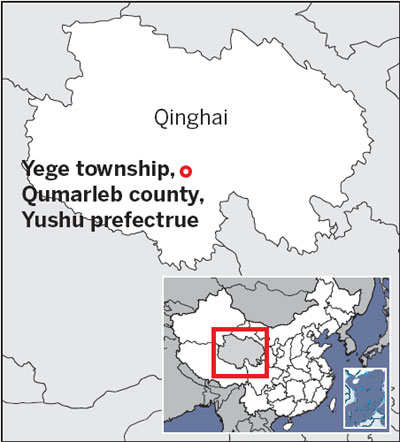Where open fields serve as facilities

"We always help others," explains Tseringbum, the English teacher at our destination, the herding community of 2,000 nomads that is Yege township in Qinghai province's Yushu prefecture.
I sleep in Tseringbum's prayer room, swaddled in yak skins, during my week on the Tibetan Plateau. There are no spare tents since last year's earthquake.
The nomads are hospitable and after two breakfasts and three lunches, I'm seated for my sixth meal at noon. Almost all the servings are of yak dairy, the staple and often only food of Yege's herders. When I can't eat much, my hosts say it must be because I'm a foreigner and dislike their diet.
Copious milk tea flow means frequent urination. Fortunately, Tseringbum's abode has about the only lavatory, made of concrete slats but without a roof. It's early August and snowflakes sprinkle my red jacket while using Tseringbum's facilities.
Even the chief of Yege's Hongqi village, Kangia, has only a yak-studded hillock for a restroom. The "toilet" nearest the student dorms is a trash pit. A yak voraciously bulldozes through the garbage. Elsewhere, we relieve ourselves in fields.
Kangia points to a knitted slingshot slung over a nail on his wall. "A Tibetan gun," he says, in Mandarin. Nomads herd with slingshots, launching salvos of stones to steer livestock.
It seems local people can't go five minutes without joking, singing or dancing.
"We say that if you can talk, you can sing. If you can walk, you can dance," the primary school's deputy headmaster Yongdingquepab tells me.
Eventually, it's time to head back to Yushu's airport, a 13-and-a-half hour ride over choppy dirt roads. We rattle like dice in a cup. This swath of the Tibet Plateau is a place where the causes of traffic jams have hooves rather than wheels.
A constant pinball game of pikas plays out across the road. Blasts of fur cause us to bow every time the driver stomps the brakes. He's not always fast enough.
We reach Longbo town, near the quake's epicenter. "We must detour," Bainaiquiang, my friend from the NGO Butter Lamp Compassion Group, announces upon our departure from Longbo. The driver jerks the truck off the dirt path. It grumbles over mountains and splashes through knee-high rivers. We reach the tent of an old woman and young monk, where we take a break and swill milk tea.
The truck bed clatters and there is a clunk against the rear windshield. I look back into the disbelieving eyes of a ram, whose horns are being lashed to the back window's frame. His horns clack against the glass and he bleats protests as we judder over choppy dirt trails.
I spend the night in a corrugated metal building near town. A driver arrives the next morning.
The temblor's ruins appear ghostlike through his van's dusty windows. I want to ask about the recovery. But the driver keeps chanting sutras. At the airport, I check the film I shot of Yege's several hundred children, waving goodbye.
They'd become too blurry for me to see during our farewells. And that had nothing to do with the camera.




















